January 5, 2019
We started the day off eating breakfast at the restaurant, Item 13, connected to our Hostel. We were served eggs, pancakes, toast, and a variety of fruits. The fruit was super fresh and sweet! The other half of the group walked over to the Pink Hostel from the Guest House, and then we started our exploration into Accra.
Our first stop was at the W.E.B. Dubois Museum and Mausoleum, and we experienced our first taste of “Ghanaian Time”. When we arrived the Museum was closed, so we got back on the bus. Then, a museum employee told us the museum would be open in an hour, so we headed towards the Artists Alliance Gallery – Omanye House.
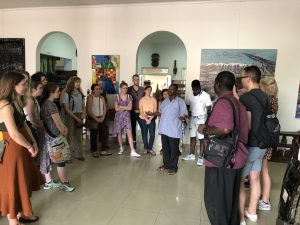
The purpose of the gallery is to promote contemporary Ghanaian Art and that of West Africa generally. The gallery gives these young artists a place to gain exposure.
Earlier in the day, and as the beginning to our endeavors in Ghana, Abduai told us, quoting from The Alchemist, that “The secrets to happiness (benefiting from the course) is to see all the marvels of the world, and never forget the drops of oil in the spoon.” Abdulai nearly “spilled his oil” at the end of our time in the gallery, as we almost missed a very powerful piece that related directly to the course. This sole piece of artwork was a painting depicting slavery.
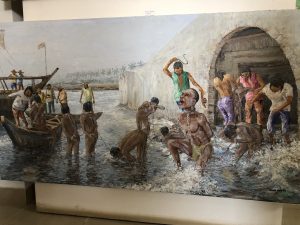
As this is a museum of contemporary art, we believe this reflects the way in which modern Ghanaian society often silences their recollections of slavery.
This single piece, burried within a huge collection of contemporary art prices and far away on the fourth floor, is apt manifestation of the inherent silence in any discussions of Slavery in Ghana. The question that arise is why people shy away from any discussion of Slavery? This is a crucial component of our interim in Ghana. When slavery comes up, or reinterpreted as often seen in the Emmancipation Day celebration, it is so done for tourism. We are heading to the north where we hope to visit slave sites and to interact with people who have had a direct relationship to slavery. Follow us to see how they deal with the burden of that knowledge.
Dubois memorial center
After the art gallery, we headed back to the W.E.B. Dubois Museum. Dubois became a citizen of Ghana in 1961, and we toured his home, which contains a research library, a lecture room, and his personal collection. After touring the house, we walked over to the Mausoleum.
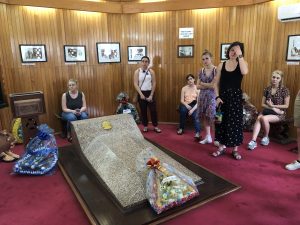
W.E.B. Dubois was given a state funeral, which shows his relevance in accordance with Ghanaian culture – specifically his relation with the first president, Kwame Nkrumah, who considered him, his mentor, invited him to Ghana and never ceased to consult with him.
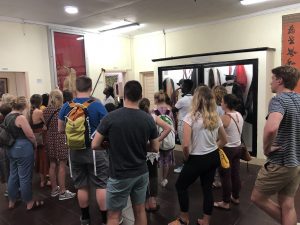
Following the W.E.B. Dubois Museum, we went to Kwame Nkrumah’s Monument and Museum
Dubois was Nkrumah’s mentor. Both Dubois and Nkrumah were advocates of Pan-Africanism. Ghana became the first country south of the Sahara to gain independence on March 6, 1957. Nkrumah became the leader of Government business and Prime Minister in 1951 and then the first President of Ghana in 1960. The Mausoleum is Nkrumah final resting place, after being embalmed in Guinea, where he fled after a political coup in 1966, and moved to his mother’s house later for grieving.
Nkrumah once said, “We face neither east nor west; we face forward”. This quote demonstrates how the society doesn’t reflect on the past, but rather looks to the future, and portrays his ideas of non-alignment. The Monument contains a statue of Nkrumah giving his speech declaring independence.
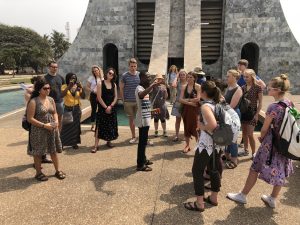
Following our busy day, we got lunch as a class and rested back at the Hostel.
Later in the evening, we reconvened to debrief. We discussed observations, such as, misconceptions of poverty, how Ghana is a country “under construction”, and the influence of China, specifically regarding neocolonialism and economic influence.
Erin, Matt, Julia, and Emily
